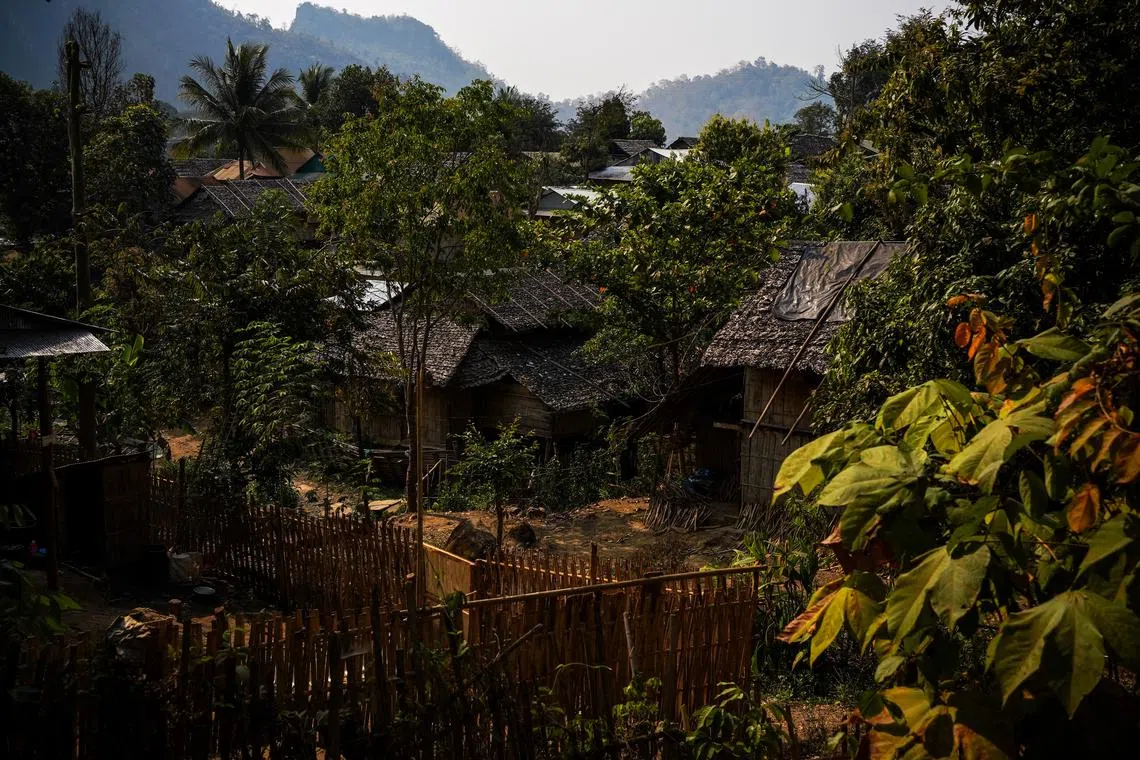US aid freeze is new threat for ailing Myanmar refugees on Thai border
Sign up now: Get ST's newsletters delivered to your inbox

Healthcare services in a mountainside refugee camp in Thailand were brought to a halt after US' aid freeze.
PHOTO: REUTERS
Follow topic:
THA SONG YANG, Thailand - A team of doctors and nurses battled to revive Ms Adabi, an 86-year-old Myanmar refugee fighting long-standing heart problems and pneumonia, as her daughter watched tearfully in a hospital in north-western Thailand.
“My mother has suffered heart disease for many years,” said 39-year-old Lay Nge, who was too distraught to say more.
Ms Adabi’s plight followed a decision by US President Donald Trump to freeze most foreign aid
The US aid helped fund services provided by the International Rescue Committee (IRC) to tens of thousands of refugees like Ms Adabi living in camps on the border between Thailand and Myanmar.
“After the IRC stopped its support, the patients didn’t get help like medicine and other things,” said Mr Tawatchai Yingtaweesak, director of the Tha Song Yang hospital, where staff revived Ms Adabi, who goes by one name.

Mr Tawatchai Yingtaweesak speaks to Myanmar refugee Maung Lay, 45, who suffers from epilepsy and was transferred to Tha Song Yang Hospital.
PHOTO: REUTERS
An IRC spokesperson told Reuters in a WhatsApp message that members of the refugee community had “self-organised” to ensure critical services for their communities as the effort was “transitioned” to the Thai authorities.
The loss of foreign aid has left Thai officials and refugee groups scrambling to fill the gap, while state-run hospitals provide care for the refugees.
The Mae La refugee settlement where Ms Adabi lives had one IRC-run hospital and two clinics to care for about 29,000 people, staffed by a handful of doctors, roughly 50 medical staff and 100 volunteers, said Mr Tawatchai.
With the IRC facilities abruptly shut, staff moved their operation to a former school, where an 18-year-old refugee gave birth on Feb 1 amid insufficient facilities, a relative and a schoolteacher said.
Mr Tawatchai will now manage the IRC hospital in the camp, after visits this month to assess its needs.
“In the medium term, we would need support on medicine and budget,” he said, citing monthly electricity costs of about 40,000 baht (S$1,600).
“I will go in to... see what more we can support. If there are in-patients, we would need a kitchen.”

A view of Mae La refugee camp following a halt in US foreign aid.
PHOTO: REUTERS
Long-term burden
Yet beyond the immediate response, Thai government hospitals may not be able to deal with the long-term burden of refugee healthcare, said Mr Kannapong Phiphatmontrikun, the head of the Tha Song Yang district.
He called for budget support from other governments or institutions, or even the Thai government, to help the hospital and staff directly tackle the situation in the camps.
“This would be the right way to address this,” he added.
Last week, Deputy Prime Minister Anutin Charnvirakul, who is also Thailand's Interior Minister, vowed that the South-east Asian nation would support refugees hit by the US suspension.
“The Thai health system will not let anyone whom we can help to die in our country,” he told reporters.
Mr Trump could go further, flagging on Feb 4 the prospect of winding down the US Agency for International Development, which distributes billions of dollars of humanitarian aid worldwide but is now in chaos.
Some Thai doctors warned of mounting strain on hospital resources.
“Thais living along the border have sacrificed enough,” said Ms Nuttagarn Chuenchom, a doctor at the Mae Sot hospital along the border, calling for healthcare staff to manage refugee services.
“Currently we have a staff shortage and patients have to wait a long time,” she added in a widely-shared post on Facebook.
In a bed in a hospital ward at Tha Song Yang, 45-year-old Maung Lay, from the Mae La refugee camp, had a bandage on his head. A fall during an epileptic seizure brought him there because the camp’s health facilities were closed, he said.
“We have no idea what will happen to us,” he added. “We don’t have money to buy medicines. We all will die if we have no medicine at the camp.” REUTERS

